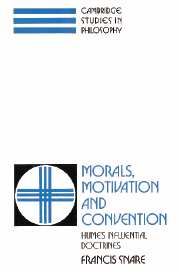Introduction
Published online by Cambridge University Press: 05 June 2012
Summary
Certain doctrines are to be found in an important and influential text: David Hume's Treatise of Human Nature, Book III, especially Parts i and ii (along with the supporting passage in II, iii, 3 and some passages from his Enquiry concerning the Principles of Morals). These provide the loci classici of a number of apparently interrelated theses and arguments in moral philosophy, philosophical psychology, social and political philosophy which have become a part of the intellectual baggage of no small number of contemporary philosophers. With only a bit of exaggeration I will call such philosophers and such doctrines ‘Humean’. Such philosophers need not be Humean in other respects, e.g. in epistemology or general philosophy of mind. Nor do all explicitly recognise their Humean tendencies even in the areas in question.
This is not so much an essay on Hume as on Humeans. It is about certain doctrines and arguments from Book III which are still of contemporary influence and importance. This essay enters into a dialogue with these Humean traditions. In some cases contemporary Humeans have re-shaped and re-argued the basic Humean positions so extensively that their positions are clearly not Hume's even if Humean. They are in the spirit of Hume. Many might be regarded as continuing or perfecting the basic Humean ideas or altering them in ways more satisfactory but somehow still in the spirit of the basic enterprise.
- Type
- Chapter
- Information
- Morals, Motivation, and ConventionHume's Influential Doctrines, pp. 1 - 8Publisher: Cambridge University PressPrint publication year: 1991

